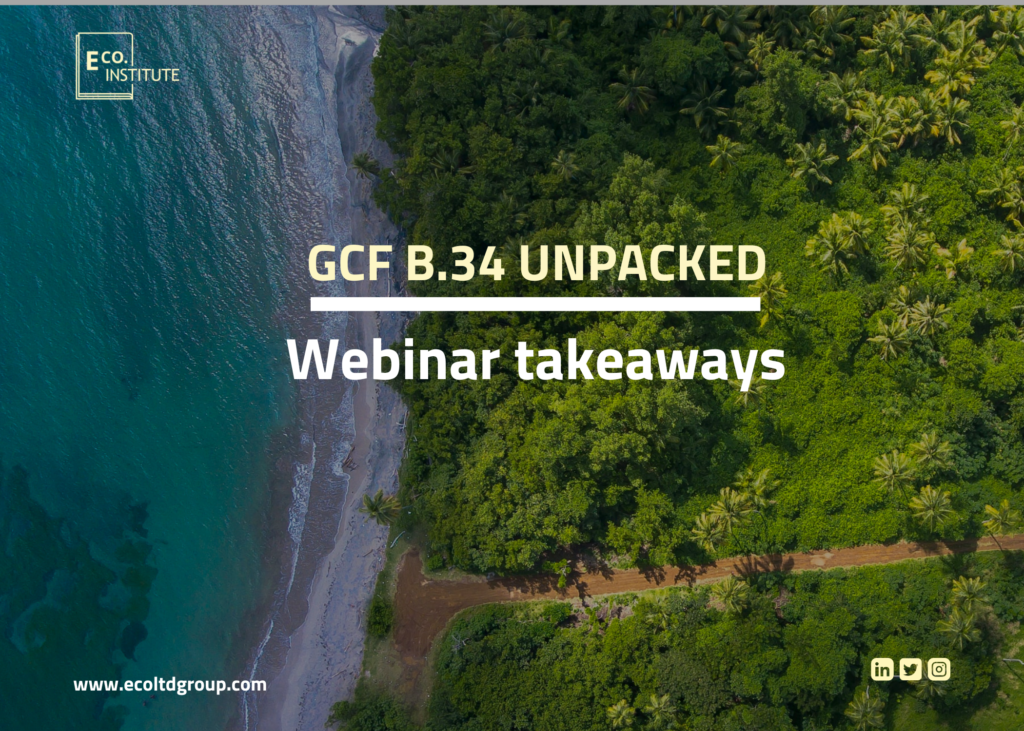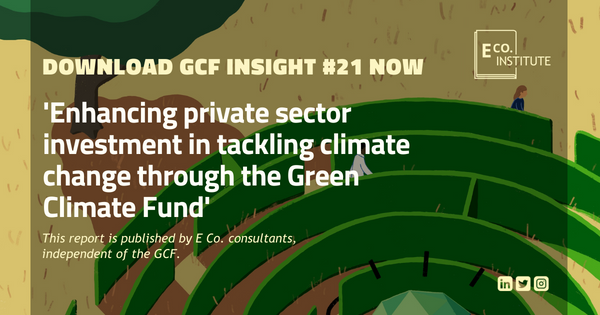The ‘GCF B.34 Unpacked’ webinar
Tags: climate finance, gcf, GCF insight, UNFCCC

On Wednesday 2 November, we held our latest ‘Unpacked’ webinar, breaking down the proceedings of GCF B.34
GCF B.34 was the 34th meeting of the GCF board, held in Incheon, South Korea. During the board meeting, nine new climate projects were approved, coming to a total of USD 544.1 million in GCF funding, and a total of USD 1.7 billion when accounting for co-financing avenues. With these nine approvals, the GCF portfolio now comprises 209 adaptation and mitigation projects around the world.
The webinar featured E Co.’s CEO, Dr Grant Ballard-Tremeer, Senior analyst, Marcus Arcanjo, and Margaret-Ann Splawn, Executive Director at the Climate Markets and Investment Association (CMIA). Together they provided a detailed analysis of GCF B.34, exploring the approved projects, accreditations, policy updates, the Work plan and pipeline, updates to the Strategic Plan and other insights.
Here’s what they discussed in detail.
- Private sector investment in climate development projects
- Insight from GCF B.34
- The challenges of GCF access
Private sector investment in climate development projects
To begin, Marcus Arcanjo discussed the findings discovered in our latest GCF insight report. In this twenty-first edition, the focus was on the challenges that the private sector experience when trying to access GCF funding. There were several main findings drawn from analysis and stakeholder surveys:
- Private sector investment in climate change is still in its relevant infancy. This is supported by findings from the Climate Policy Initiative, which states that in 2019 and 2020, only 2% of adaptation finance came from the private sector.
- New and unproven markets are not popular spaces for investment.
- Adaptation projects can be difficult to structure and not easy to monetise.
- Respondents to our survey said the provision of first-loss guarantees, blended capital approaches or results-based payments would be helpful.
There are also several issues regarding how private organisations can access the Fund:
- Accessing the Fund remains a challenge, especially for smaller private companies and those with little experience with the GCF or little capacity
- There’s little certainty around whether these micro, small and medium-sized enterprises (MSMEs) have a realistic chance of gaining GCF support.
- Even larger private sector actors with access to the GCF do not currently have any approved projects.
The report discovered that these issues mean that there is a real lack of private sector engagement within climate finance. Considering that the private sector commands huge amounts of capital, with US climate envoy John Kerry stating “No government in the world has enough money to solve the climate crisis”, increasing private sector engagement is vital.
Our findings reported that one of the most effective ways to engage private sector stakeholders is to engage domestic private sector actors, including commercial banks, local financial institutions, capital market players and enterprises to increase their participation in GCF-funded activities.
Now and in the future, stakeholders are looking towards the GCF’s Private Sector Facility as the way forward. The private sector wants to see the GCF focus on promoting a conducive investment environment for combined climate and economic growth activities.
You can download your own copy of the twenty-first GCF insight report by clicking below.
Insight from GCF B.34
The webinar then turned to the overall agenda of the 34th board meeting. GCF B.34 occurred at the end of GCF 1, the final year of this round of funding, which means we’re at a point where the GCF is looking for more funding. We’ve also seen almost a full utilisation of the money the GCF have to use, with only 22 million in unused commitment authority.
For 2023, the work plan target is not about what it can do in terms of programming, but rather what it can finance in terms of commitment authority. As ever, there are more projects to be financed than money available to fund them.
Also, interestingly, private sector projects are bigger than public ones. This is an indication that the demand for concept notes far outstrips the available funding.
Discover a new GCF project in detail
One of the projects approved at GCF B.34 was ‘Enhancing Adaptation and Community Resilience by Improving Water Security in Vanuatu with Pacific Community (FP191)’. It covers improving water safety and security for vulnerable communities in Vanuatu. We’re proud of the approval, as it was a small team of E Co. consultants that developed the project and recommended implementation strategies.
If you would like to read more about FP191, head to our case study here.
The challenges of GCF access
Is there a problem with GCF access? This was one of the questions posed to the webinar attendants, and responses were varied.
Yannick Glemarec, Executive director at the GCF, was quoted as saying “Do we have a problem with access? No. We have too much demand than we can supply.” As was stated previously, there are too many projects to provide finance to. Glemarec had suggested that to better understand the access issues felt, it would be necessary to analyse it through the lenses of ease, simplicity, speed and volume.
Gaining access to GCF funding requires organisations to become a delivery partner, or Accredited Entity. Unfortunately, this can take up to two years and so presents a significant challenge for the private sector, especially MSMEs. Navigating what you need to do this is a long and not-straightforward process, requiring time, money and commitment. Many organisations simply don’t have these things to give on top of their conventional duties.
One opinion stated during the webinar is that the GCF’s board doesn’t realise the extent of the challenges the private sector faces during access. Additionally, as the GCF is a mechanism of the UNFCCC, private sector organisations are less likely to understand the processes this entails. Grant Ballard-Tremeer described it as “two worlds colliding”, which causes pain points in both entry to the GCF and following through on projects.
If you would like to keep up to date with our webinars, training sessions, articles and other contributions to the world of climate finance, sign up to our newsletter to keep in touch.
Looking for insight into climate finance? Look no further
Let’s accelerate progress together: Get in touch with our climate finance consultants to discuss a project you’re working on. Email us at: amy@ecoltdgroup.com or find us at the following:
Twitter: @ecoltdnews
LinkedIn: E Co.
Instagram: @ecoltdnews
Please feel free to share your comments below or send an email to: gcfinsight@ecoltdgroup.com

Join the conversation by posting a comment below. You can either use your social account, by clicking on the corresponding icons or simply fill in the form below. All comments are moderated.